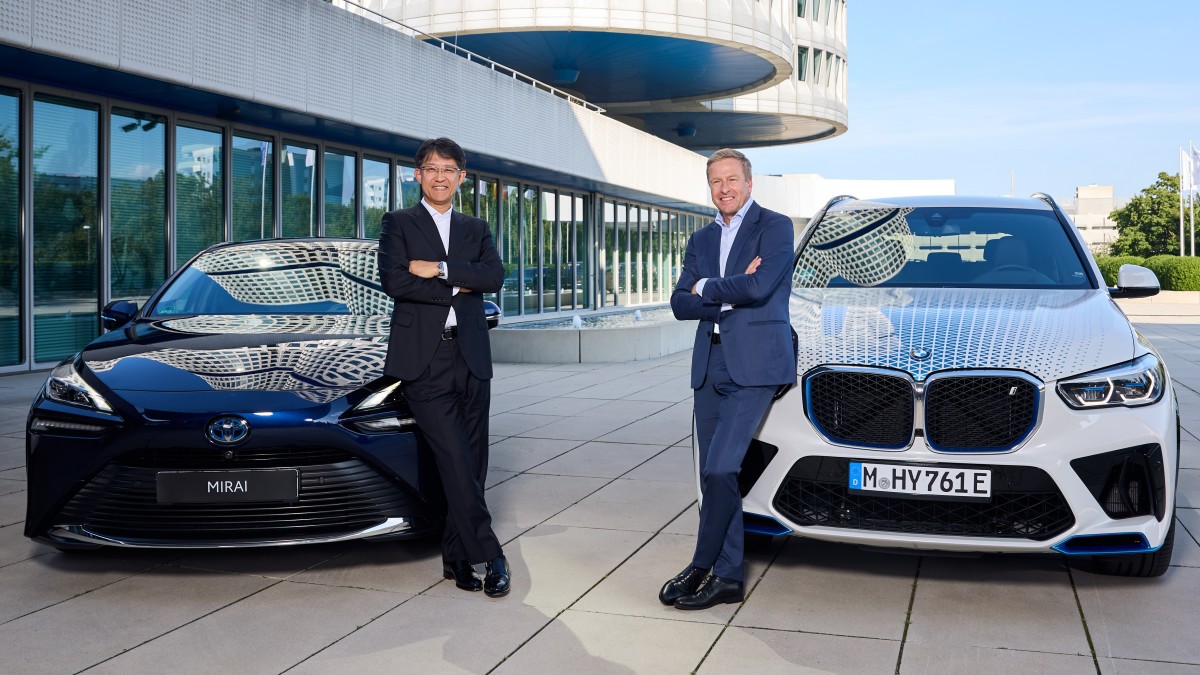
BMW, TOYOTA TAKE A RISKY GAMBLE ON A FAILING PRODUCT
Battery-electric vehicles such as those made by Tesla are becoming the poster child for zero-emissions motoring and the focus of attention by some lawmakers when it comes to rules and regulations that dictate the kind of cars that we will be allowed to buy or drive in the future.
Other vehicle choices on the market do not require as much change, sacrifice, or commitment, such as hybrids and plug-ins, which can be run on gasoline from a normal gas station.
Related: Hyundai's latest EV is a threat breathing down Tesla's neck
However, German luxury automaker BMW and Japanese auto giant Toyota are placing a significant amount of chips on products powered by a fuel of the future that is being embraced by other automakers such as Hyundai.
Still, this might turn out not be the smartest decision they've ever made.
Bavarian [Hydrogen] Works
According to a recent announcement, BMW (BMWYY) and Toyota (TM) will collaborate on a brand-new hydrogen-powered vehicle that will be released in 2028.
The duo intends for the new offering to establish hydrogen fuel-cell technology, consisting of a hydrogen-powered generator, batteries, and electric motors, as an alternative to the battery-electric vehicles the two brands already offer.
Little information about the new car has been disclosed, but BMW says it will be based on an existing model in its portfolio. This means that a hydrogen 3-Series or 5-Series sedan or X3 or X5 crossover SUV is not entirely off the table.
However, the Japanese-German duo said they would jointly develop a "next-generation powertrain technology," which will be used in cars in both automakers' lineups.
Ultimately, they expect the results of this collaboration to expand the amount of hydrogen fuel-cell cars on the market and provide more choices to fuel conscious customers.
More Automotive:
- The Toyota Crown is a masterclass in cheap, quiet luxury
- Ford making radical change that might anger loyal consumers
- Gavin Newsom's 'EV mandate' is under U.S. Supreme Court threat
The [not-so] Ultimate Driving Machine
Committing to depending on an infrastructure that supports cars that do not run on normal gasoline is already a sacrifice in itself, as most drivers in the United States are used to gasoline's convenience and easy availability.
Already, drivers have to commit to charging up expensive electric cars at EV charging stations that may have long lines due to 'charger hogs,' but living with a hydrogen car is a sacrifice that one will have to commit to with all of one's heart.
According to information on the automaker's website, the Toyota Mirai, one of the very few hydrogen-powered cars on the market, has an effective range of up to 402 miles.
That sounds amazing compared to battery-powered EVs like Tesla's. Still, while over 17,000 Tesla Superchargers are spread across 50 states, hydrogen-powered cars are essentially landlocked in California.
According to data from the U.S. Department of Energy, hydrogen fueling infrastructure has not developed beyond the Golden State, as all 55 hydrogen fueling stations in the country are located solely in the state. Additionally, if you do manage to live near one of these stations, primarily populated in the San Francisco Bay Area and Los Angeles, expect to pay prices that make filling up a Ferrari look like a bargain if you can find a functioning station.
During Donut Media's test of a Toyota Mirai, host Nolan J. Sykes noted that unlike EV chargers that are hooked up to the power grid or gas stations that are regularly topped off with fuel, an app they used to find hydrogen fueling stations showed that many of the stations are either offline or simply out of hydrogen.
"You could drive a long way to get to a station that the app says its working, wasting a good amount of your precious fuel in the process and then [the fueling station] can be closed anyway, or there could be a massive line, or the guy that got there just before you had the pump freeze to his car." Sykes said.
Sykes noted that during the test, the car used relatively little hydrogen, which was reflected when they effectively topped off the tank by filling it with one kilogram of hydrogen, which cost $27.70. Toyota says that the Mirai's tank holds "approximately 5 kilograms," which would estimate a full tank at $138.50.
Related: Hyundai's latest EV is a threat breathing down Tesla's neck
That is not cheap. In comparison, data from the American Automobile Association (AAA) shows that at the average price of $4.981 for a gallon of premium gas in Los Angeles at the time of writing, it would cost just $105.09 to fill up the 21.1-gallon tank of a 2024 Ferrari Roma.
Because high fueling costs have dampened the appeal of the Mirai, as of July 4, Toyota has been offering discounts of $33,000 off the top of the line Limited model, and $25,000 off the $50,190 sticker price of the base XLE model. Additionally, Toyota will throw in a hydrogen "gas card" worth $15,000.
In their statement, BMW and Toyota said that they are "advocating the creation of a conducive framework by governments and investors to facilitate the early-stage penetration of hydrogen mobility and ensure its economic viability" and "seeking regional or local projects to further drive the development of hydrogen infrastructure through collaborative initiatives."
Bayerische Motoren Werke (BMW) trades on OTC markets as BMWYY, and is tafing at $29.71 at the time of writing.
Toyota Motor Company trades under the ticker TM on the New York Stock Exchange. At the time of writing, the stock is down 1.29%, trading at $182.21.
Related: Veteran fund manager sees world of pain coming for stocks
2024-09-05T23:51:39Z dg43tfdfdgfd